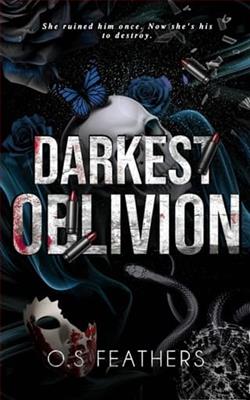Page 21 of Cowgirls Love French Kisses
His name comes to mind like a song you can't stop humming. We were talking and laughing, sharing pieces of ourselves like we were patching together a quilt. I turn, wondering if he passed out like I did, fully clothed on top of the covers, but the other side of the bed is just a cool expanse of sheets.
As I rub the sleep from my eyes, the room comes into sharper focus. The conversations from last night replay in my mind.
We had talked about everything. When I told him about the day Grampa passed, how I felt like the ground had given way beneath me, Mathieu had reached across the sheets to take my hand. His grip was strong and warm, like an old friend.
And when he shared his own story, how as a teenager, he'd felt the sting of being left out—the look in his eyes made my heart twist. He spoke of the friends who had become his family, the ones we met last night, how they scooped him up and showed him he'd never have to stand alone again.
Moving back to Paris wasn't just a change of scenery for him; it was returning to a family he'd chosen, a chance to rediscover the parts of himself he thought he'd lost. There was a tear that escaped then, one he quickly brushed away with the back of his hand, but it was full of so much truth it nearly knocked the wind out of me.
Oh man, and how we laughed. Over nothing. Over big things. Over silly things. It felt so good to laugh away a massive day, a massive change, and giggle into the night.
The laughter feels distant now. Where did Mathieu end up sleeping then?
He’s not on the floor. I swing my legs over the side of the bed, the soft carpet squishing between my toes.
“Mathieu?” Nothing but crickets answer back.
I stand and pace to the window, the city below just waking up. The sunlight is bright and cheerful, a day waiting for me to discover it.
The sitting room. He must have slept there, like he said he would.
“Mathieu?” My voice is raspy with sleep. I open the door to the sitting room, expecting to see him all crumpled and sleep-ruffled.
It’s empty.
Then it comes back to me—a memory, soft and clear. A voice whispering “Au revoir, ma petite Americaine,”and the feather-light brush of lips on my forehead.
Did I dream it?
No, it was too real, too warm.
I touch my forehead, looking for a trace of his kiss, proof that he was here.
But he's gone. I'm alone in the city again, left with the morning sun and a memory of the sweetest kiss I’ve ever known.
THREE WEEKS LATER
CHAPTER10
Annie
“So, a tricky thing about English,”I say, tapping my mini-whiteboard with a marker, “is that prepositions can be a real bucket of worms.”
A couple of my pupils squint at their own notebooks, pens hovering over paper like dragonflies over a summer pond.
Moments like this, I have to take a deep breath and remind myself that this is my real life.
Because it’s all thanks to a teeny ad in the paper that said:Seeking native English speaker from America for one hour a day to teach six difficult students.
Those difficult students are CEOs of six major businesses in central Paris. The first day I met with them, Monsieur Levant explained they were an elite group who demanded to learn English the way “real” Americans spoke, not like the teachers taught.
And I was the first who had ever replied to their ad, despite it being published twice a week for three months. Go figure.
But maybe I’m the only one desperate enough to earn a little cash, and with what they were offering and the incredible location—theLouvre,people!—I was not going to say no.
So here we are, at Café Marly, nestled inside the Louvre area. First thing that hits you is this swanky blend of old-world charm and chic modern flair, like stepping into a history book spruced up with a dash of Parisian glamor. I'm lounging on one of their plush red seats, eyeing those grand arches that frame a postcard-perfect view of the Louvre's glass pyramids.
The other benefit of this lunchtime class is that they pay the food bill.















